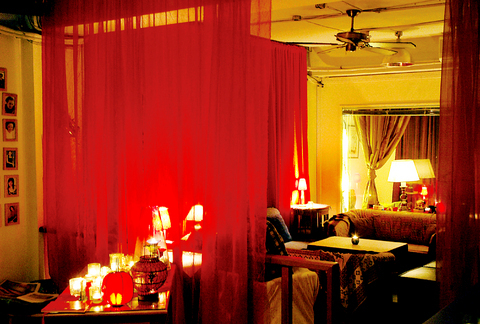A home for experimental musicians, dancers and performers, the Living Room offers a venue for artists to create and visitors to appreciate alternative entertainment. It's not a new spot, having been around since 1999, but in the last year both its interior design and nightly scheduling have been overhauled.
Started by US musician Corbett Wall as a pet project, the restaurant/lounge began as a site for struggling musicians to rehearse and perform. "After a while people started asking if they could have a beer when rehearsing or watching the show. Later, they'd ask if Irene [his wife] could make them something to eat. I guess things just sort of fell into place after that ?. Before I knew it I had a bar," Wall said.

PHOTO COURTESY OF ASHLEY PENG
With experience as both a well-known saxophone player and producer, Wall doesn't have difficulty drawing a crowd. Likewise, his acquaintances in the media and music industry provide valuable contact opportunities for up-and-coming performers who make use of his stage.
The revamped monthly format aims to offer diverse entertainment every night of the week. From Monday's hot pot dinner and live jazz to foreign films, spoken word, performance art and dance, Wall doesn't want to limit the venue to one genre.
He books shows a month in advance but is always open to new talent. In fact, he hopes to attract more experimental and alternative performers. "I want creative people to have a space and be able to try out new things. This is more than just a bar; we are trying to promote an artistic lifestyle," he said.
The Web site is a free call for musicians and artists who want to register to use the space. Basically those with a band play or develop a concept for an event and pitch the idea to Wall, who seldom turns people away. Performers are given a room to entertain and one hundred percent of the door, if they charge a cover. The venue in turn charges a NT$300 minimum fee per person, which guarantees two drinks. It's a slight turnoff to those only interested in seeing the band but it is a small price to pay for live entertainment.
Other transformations include the addition of Aliang, former proprietor of Aliang and Friends, as a co-manager. The Taiwanese artist joined Wall and his wife in December bringing with her a collection of artist friends.
Often seen mixing drinks behind the bar, Aliang and her influence will be more visible when plans to take over the second floor materialize this spring. If everything goes according to plan, the extra floor will be used as a visual art space and restaurant to allow the performance area on the current floor to be expanded.
Still, some things never change. The restaurant's menu continues to offer the same home-cooked food at reasonable prices. Instead of choosing from a menu, customers offer up their dislikes and budget. The chef then prepares them a suitable meal.
The Living Room will take a one-week Lunar New Year holiday, beginning this Sunday. It will re-open with Mandarin rockabilly music from Sugar Lady on Valentine's Day (February 14).
The Living Room is located at 3 Fl, 8 Nanjing E Rd, Sec 5, Taipei (南京東路5段8號3樓). It is open daily from 6:30pm to 1am. For details on upcoming events or bookings check the website at www.livngroomtaipei.com

Google unveiled an artificial intelligence tool Wednesday that its scientists said would help unravel the mysteries of the human genome — and could one day lead to new treatments for diseases. The deep learning model AlphaGenome was hailed by outside researchers as a “breakthrough” that would let scientists study and even simulate the roots of difficult-to-treat genetic diseases. While the first complete map of the human genome in 2003 “gave us the book of life, reading it remained a challenge,” Pushmeet Kohli, vice president of research at Google DeepMind, told journalists. “We have the text,” he said, which is a sequence of

On a harsh winter afternoon last month, 2,000 protesters marched and chanted slogans such as “CCP out” and “Korea for Koreans” in Seoul’s popular Gangnam District. Participants — mostly students — wore caps printed with the Chinese characters for “exterminate communism” (滅共) and held banners reading “Heaven will destroy the Chinese Communist Party” (天滅中共). During the march, Park Jun-young, the leader of the protest organizer “Free University,” a conservative youth movement, who was on a hunger strike, collapsed after delivering a speech in sub-zero temperatures and was later hospitalized. Several protesters shaved their heads at the end of the demonstration. A

Every now and then, even hardcore hikers like to sleep in, leave the heavy gear at home and just enjoy a relaxed half-day stroll in the mountains: no cold, no steep uphills, no pressure to walk a certain distance in a day. In the winter, the mild climate and lower elevations of the forests in Taiwan’s far south offer a number of easy escapes like this. A prime example is the river above Mudan Reservoir (牡丹水庫): with shallow water, gentle current, abundant wildlife and a complete lack of tourists, this walk is accessible to nearly everyone but still feels quite remote.

In August of 1949 American journalist Darrell Berrigan toured occupied Formosa and on Aug. 13 published “Should We Grab Formosa?” in the Saturday Evening Post. Berrigan, cataloguing the numerous horrors of corruption and looting the occupying Republic of China (ROC) was inflicting on the locals, advocated outright annexation of Taiwan by the US. He contended the islanders would welcome that. Berrigan also observed that the islanders were planning another revolt, and wrote of their “island nationalism.” The US position on Taiwan was well known there, and islanders, he said, had told him of US official statements that Taiwan had not